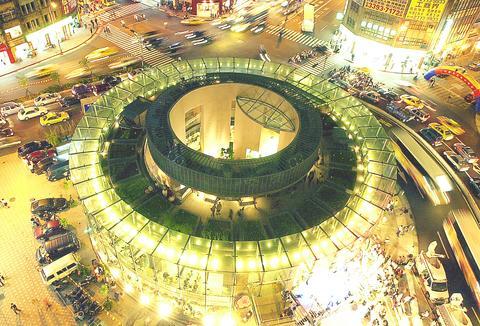After 17 months of reconstruction, the 93-year-old Chien-Cheng Circle food market in Taipei's Tatung District reopened yesterday evening.
Due to the two devastating conflagrations in 1993 and 1999, Taipei City Government decided in March 2001 to revitalize the time-honored food market. Taipei Mayor Ma Ying-jeou (馬英九) ordered the demolition of the Chien-Cheng Circle and announced that its reconstruction was one of the projects aiming to revitalize Taipei's older districts.
The reconstruction cost the city government about NT$160 million in construction and NT$50 million in compensation for old vendors residing in the former building.

PHOTO: SEAN CHAO, TAIPEI TIMES
Located at the intersection of Chungching North Road, Nanking West Road and other four arteries, the Chien-Cheng Circle has been part of the collective memory of many Taipei citizens as well as international visitors because of the Taiwanese delicacies available there all night.
Dubbing the opening of the new circle as "the reappearance of Taipei's halo," the city government yesterday gave away 700 food-tasting coupons of NT$100 each and organized a tour of the historical building.
The tour was led by Chuang Yung-ming (莊永明), who is a vice chairman of the municipal historical research department and also a professor at Taipei Medical University.
Branded Taipei's new delicacies landmark, the brand new Chien-Cheng Circle is a cylindrical two-story glass building accommodating 20 food-vending booths, as well as a performing arts center on the top of the building.
Designed on the theme "the circle of life," the architect Lee Tsu-yuan (李祖原), a nationally distinguished architect who also designed the Taipei MRT's Hsintien Depot, said that he wanted to let people enjoy traditional fare in a modern building, attracting both old and young customers.
Blooming since the Japanese colonial era, the Chien-Cheng Circle was the most bustling and popular night market in northern Taiwan.
In its heyday during the 1960s and 1970s, there were about 100 booths selling popular Taiwanese snacks such as glutinous rice dumplings, oyster omelettes, fish ball noodles, unfried spring rolls and other delicacies.
During the reconstruction, the engineering team unearthed a reservoir from the center of the circle which was constructed by Japanese soldiers during World War II.
The city government has announced the reservoir as the 105th historic spot in Taipei.
Huang Jung-feng (
"It is Taipei's pride," Huang said.

Alain Robert, known as the "French Spider-Man," praised Alex Honnold as exceptionally well-prepared after the US climber completed a free solo ascent of Taipei 101 yesterday. Robert said Honnold's ascent of the 508m-tall skyscraper in just more than one-and-a-half hours without using safety ropes or equipment was a remarkable achievement. "This is my life," he said in an interview conducted in French, adding that he liked the feeling of being "on the edge of danger." The 63-year-old Frenchman climbed Taipei 101 using ropes in December 2004, taking about four hours to reach the top. On a one-to-10 scale of difficulty, Robert said Taipei 101

Nipah virus infection is to be officially listed as a category 5 notifiable infectious disease in Taiwan in March, while clinical treatment guidelines are being formulated, the Centers for Disease Control (CDC) said yesterday. With Nipah infections being reported in other countries and considering its relatively high fatality rate, the centers on Jan. 16 announced that it would be listed as a notifiable infectious disease to bolster the nation’s systematic early warning system and increase public awareness, the CDC said. Bangladesh reported four fatal cases last year in separate districts, with three linked to raw date palm sap consumption, CDC Epidemic Intelligence

Two Taiwanese prosecutors were questioned by Chinese security personnel at their hotel during a trip to China’s Henan Province this month, the Mainland Affairs Council (MAC) said yesterday. The officers had personal information on the prosecutors, including “when they were assigned to their posts, their work locations and job titles,” MAC Deputy Minister and spokesman Liang Wen-chieh (梁文傑) said. On top of asking about their agencies and positions, the officers also questioned the prosecutors about the Cross-Strait Joint Crime-Fighting and Judicial Mutual Assistance Agreement, a pact that serves as the framework for Taiwan-China cooperation on combating crime and providing judicial assistance, Liang

US climber Alex Honnold left Taiwan this morning a day after completing a free-solo ascent of Taipei 101, a feat that drew cheers from onlookers and gained widespread international attention. Honnold yesterday scaled the 101-story skyscraper without a rope or safety harness. The climb — the highest urban free-solo ascent ever attempted — took just more than 90 minutes and was streamed live on Netflix. It was covered by major international news outlets including CNN, the New York Times, the Guardian and the Wall Street Journal. As Honnold prepared to leave Taiwan today, he attracted a crowd when he and his wife, Sanni,